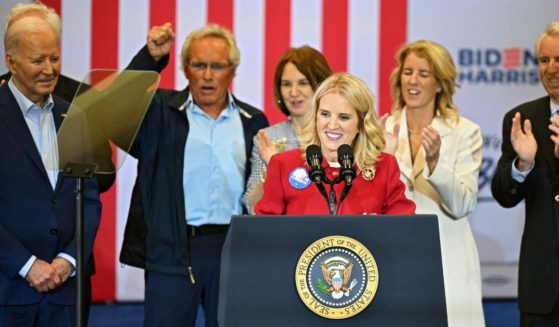Biden in 1976: Criminals Should Be Punished, 'We Have Not Found a Way To Rehabilitate'
It’s been said time and time again about Joe Biden: His biggest problem is that he has a past that he has to run on.
In a Democratic presidential field where most of the candidates are fresh faces, Biden’s been in public life since 1972. That was a very different time, and then as now Biden was pretty unguarded about his opinions.
Thus, things he said back in the old days have come back to haunt him in a major way. It began with comments he made about busing and it hasn’t stopped since.
Now, as Biden’s role in the 1994 crime bill gets more reexamination and criticism from the left, resurfaced audio from the 1970s shows the then-senator from Delaware taking a tough line on crime and saying that society had yet to find a way to rehabilitate prisoners.
The speech, according to the Washington Examiner, was from a 1976 Jefferson-Jackson Dinner in Boise, Idaho. In it, he said liberals needed to focus more on punishment than rehabilitation when it came to those who were incarcerated.
“We liberals stand up and we say, ‘What we need to do is rehabilitate,’” Biden said.
“And yet we go to any university in the United States of America and we find among the [academics] a recognition of the fact that we do not know how to rehabilitate.”
“We have not found a way to rehabilitate. And yet we conduct the debate and tell ourselves if we only had more money we’d correct the system. That is not true. Flat out not true,” he said.
Biden then chastised Democrats who emphasized the rehabilitative over the punitive aspects of the penal system.
“Why should we liberals, why should we Democrats, apologize for saying a criminal justice system has implicit in it the idea that a crime should be met with a punishment? What is wrong with that? I don’t know. I don’t have any idea,” he said.
“If you commit a crime you should be accountable for it. And you don’t have to be some racist so-called redneck to say that.”
“When we don’t respond, we don’t talk in those terms, we allow men like [George Wallace] to run around the nation talking about ‘pointy-headed federal judges’ and about the fact that we need more severe penalties in the government for crime, and people begin to believe him,” Biden said.
Wallace, then the governor of Alabama, ran for the Democratic Party’s presidential nomination in 1964, 1972 and 1976, with varying degrees of success. In addition, he launched a run as an independent in 1968, becoming the last individual not of a major party to win a state.
While most of his appeal to voters was his staunch opposition to segregation, his tough stance on crime also earned him votes.
“We don’t respond and give the field to him, to what the majority of the American people know makes good common sense, that if you commit a crime you should be accountable for it,” Biden said.
This is a problem, of course, because of the fact that Biden was one of the architects of the 1994 crime bill, a piece of legislation now credited by liberals with starting a trend toward mass incarceration.
Biden, for his part, isn’t taking responsibility for it, because of course he’s not.
“I got stuck with it because I was the chairman of the Judiciary Committee, writing most of the drug legislation that occurred in that period,” Biden has said.
“The big mistake was that I was buying into the idea that crack-cocaine was different than powdered cocaine and having penalties should be eliminated.”
The disparity in sentencing between powdered cocaine and crack cocaine is often seen as a racist policy which sought to punish African-Americans and other minorities due to the perception that crack was more often used by those in the inner city.
Meanwhile, Biden’s current plan sounds very different than he sounded on crime in 1994 or 1976.
“Today, too many people are incarcerated in the United States – and too many of them are black and brown. To build safe and healthy communities, we need to rethink who we’re sending to jail, how we treat those in jail, and how we help them get the health care, education, jobs, and housing they need to successfully rejoin society after they serve their time,” Biden’s website reads.
“Our criminal justice system must be focused on redemption and rehabilitation. Making sure formerly incarcerated individuals have the opportunity to be productive members of our society is not only the right thing to do, it will also grow our economy.”
People can change, of course. Take, for instance, the aforementioned Wallace, who became a born-again Christian, apologized for his segregationist stances and served another term as governor in the 1980s as a much different man.
That being said, Biden’s decision to run from his past has more than a whiff of opportunism about it.
In a race where California Democratic Sen. Kamala Harris is being eviscerated for being an ineffectual attorney general not because she didn’t lock up enough people but because she locked up anyone to begin with, ever having been hard on crime is a scarlet letter on any candidate’s record.
That’s why this is yet another problem for Biden. Not only did he say that the Democrats should be tough on crime, he actually suggested that criminals couldn’t be rehabilitated.
What’s changed in the intervening 43 years is anyone’s guess, but this quote’s going to get a lot of play, one suspects. That’s the problem with having a past: In a Democratic Party that’s moving to the left with great rapidity, it’s not just a liability but a millstone around the neck of one’s candidacy.
Truth and Accuracy
We are committed to truth and accuracy in all of our journalism. Read our editorial standards.












